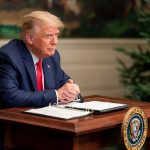**Top Secret Leak: Consequences and Political Fireworks in the U.S.**
A significant leak of American intelligence documents concerning Israel’s potential response to Iran’s missile threats has led to a flurry of chatter and concern among lawmakers and citizens alike. These documents, which the Wall Street Journal claims include Israel’s preparations for a far-reaching strike, became available on the internet through a site that describes itself as independent but has pro-Iran leanings. In an age where cyber security is as vital as one’s morning coffee, the fact that sensitive information can slip into untrustworthy hands raises alarm bells across the board.
The authenticity of the leaked documents has been confirmed by John Kirby, who states these documents indeed represent real intelligence. The leakers, in an astonishing twist, claim they received a tip about the files and deny any connection to the original source. This revelation paints a picture more reminiscent of a spy thriller than the straightforward politics Americans have come to expect. It seems a federal crime has turned into a live-action drama, with treasonous implications that have left many scratching their heads.
Republican senators gathered in Florida for a rally have taken a strong stance against the leak. Senator Marco Rubio passionately described it as not just a breach of trust but qualified it further as an act of treason—a stern reminder that aiding a regime that chants “death to America” every Friday is no small matter. His fervor reflects the sentiments of many who feel that such leaks undermine the integrity of American foreign policy. It’s as if someone decided to play a game of Jenga with national security—removing one piece could bring the whole tower crashing down.
Senator Tom Cotton echoed these sentiments, alluding to a year-long pattern of leaks that he feels have been hostile to Israel. He characterized the current administration’s approach to Iran with a hint of mistrust, suggesting that the individuals in charge are not just passive observers but sympathizers of Iran and its networks. Cotton’s warnings about the administration’s alleged leanings raise concerns that, without a change in leadership, the loyalty of the U.S. to its allies may wane.
As tensions escalate, the senators emphasized the need for a Republican majority in the upcoming elections, arguing that the future of U.S.–Israel relations hangs in the balance. They made it clear that not only must they maintain their seats, like Senator Rick Scott’s pivotal role in Florida, but they must also reclaim lost ground in other states to ensure that America can take a cohesive stand on the international stage. The crowd, resonating with shouts of support, eagerly anticipates a future where American interests are prioritized over playing nice with adversaries.
As election fever grips the nation, residents are reminded of the power of their vote and its consequences. There is an undercurrent of urgency among party members, indicating that this election is not just about local stories but carries the weight of international implications. Seeing the Senate race tighten highlights a critical moment: get out and vote, fellow citizens. The message is clear—every ballot is a step toward either securing or jeopardizing the unwavering support for allies like Israel. With stakes as high as they are, one can almost hear the echoes of democracy calling from the voting booths.




